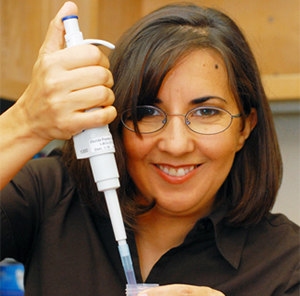Dr. Annette Khaled on Her Advances in Breast Cancer Research
October 5, 2015
 The journey Associate Professor Annette Khaled, Ph.D. took to becoming a cancer researcher didn’t actually begin with cancer research in mind. After receiving her doctorate in Molecular Genetics and Microbiology from the University of Florida, where she studied T-cells (or T-lymphocytes—a type of white blood cell), she went on to the National Cancer Institute in Frederick, Maryland to pursue her post-doctoral studies, working on the cytokine interleukin-7 (IL-7). During her time there, she studied how T-cells and immune responses worked. Khaled didn’t actually start researching cancer until about five years ago.
The journey Associate Professor Annette Khaled, Ph.D. took to becoming a cancer researcher didn’t actually begin with cancer research in mind. After receiving her doctorate in Molecular Genetics and Microbiology from the University of Florida, where she studied T-cells (or T-lymphocytes—a type of white blood cell), she went on to the National Cancer Institute in Frederick, Maryland to pursue her post-doctoral studies, working on the cytokine interleukin-7 (IL-7). During her time there, she studied how T-cells and immune responses worked. Khaled didn’t actually start researching cancer until about five years ago.
“How I became involved in cancer research was really driven by need, more than anything else,” she said. “We had made some discoveries through the study of basic biology, of how cells work, that could potentially have an application in cancer treatment.”
Within the past five years, Khaled and her team at the Burnett School of Biomedical Sciences have researched the basics of cancer, grown to understand cancer patients’ needs, and have explored new cancer treatments through interacting with clinicians, surgeons, and oncologists. This interaction highly informs Khaled’s research.
—
Khaled concentrates her efforts on metastatic breast cancer research and explained that if breast cancer is localized, then it’s curable, which is why mammograms and screenings are important. The problem is that it could come back later, or recur, as one reaches their 60s or 70s. That is when breast cancer becomes metastatic, incurable, and ultimately fatal. According to the American Cancer Society, metastatic breast cancer (or advanced breast cancer/Stage IV) has a five-year survival rate of just 22 percent. This recurrent, metastatic breast cancer lead Khaled to wonder if she can help find a cure.
Khaled studies triple negative breast cancer, most commonly found in African-American and Hispanic women. Khaled chose these type of cancer cells because it’s difficult to treat, it recurs, and it can become metastatic: “If you can cure triple negative breast cancer, you’re curing the worst types of cancer.”
Although Khaled sees cancer treatment moving towards a more personalized approach—where every patient’s cancer is unique—her research is exploring more common denominators across varying types of cancer. When we spoke with Khaled last year, she discussed her discovery of the peptide CT20, a therapeutic treatment for cancer patients. More recently, she found that in breast cancer, the more advanced the stage, the higher the peptide target — CCT (Chaperonin Containing T-Complex) — was expressed. Khaled wondered if this would be seen in different types of cancers, later learning that it indeed has been exhibited in prostate, lung, ovarian, and pancreatic cancers. She is currently investigating if this pattern will be found in head and neck cancers as well. The hope is that this discovery will lead to a more generic type metastatic cancer treatment.
—
Khaled’s innovations are fueled by collaboration, and she shares her expertise and success with her students. “I have really great students in the lab. I have one that just graduated this summer, who is now staying on as a post-doc in the lab, Rania Bassiouni.” Khaled also has two new graduate students and one honors undergraduate student working in her lab. “It’s exciting. We mutually excite each other.”
Additionally, Khaled had high praise for UCF’s leadership in the College of Medicine, specifically Dr. Deborah German, Vice President from Medical Affairs and Dean of the College of Medicine, Griffith Parks, Ph.D., Director of the Burnett School of Biomedical Sciences, and Sampath Parthasarathy, Ph.D., Associate Dean for Research in the College of Medicine, and whom Khaled considers as a mentor. “They have just done everything they could to facilitate our ability to do research, our ability to teach. They do whatever we need to be successful.” Khaled has also collaborated with Florida Hospital and the Orlando VA Medical Center. These institutions provide tissue samples and, more importantly, opportunities to engage with clinicians.
With her immunology expertise and collaborative efforts, Annette Khaled is getting closer to transforming metastatic cancer from an inevitable death sentence to a curable disease.
—
Khaled’s targeted therapy for metastatic breast cancer is available for licensing. For more information contact Benjy Neymotin.